Round 5 Game 2: Chinese momentum, Uzbek steel, and Armenian tragedy in a thrilling day of chess
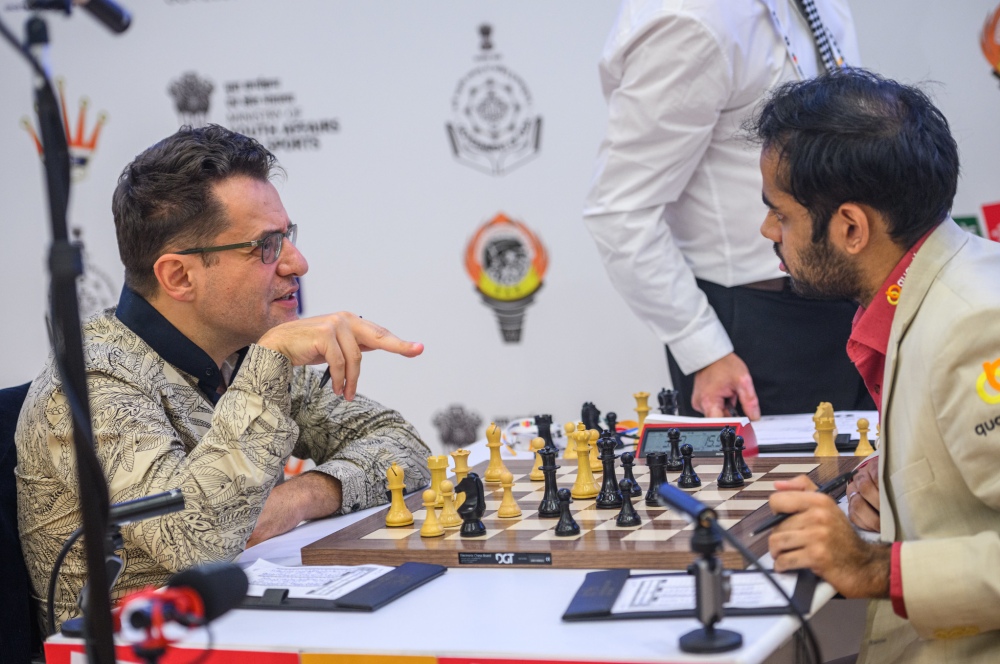
Round after round, the FIDE World Cup in Goa continues to deliver high-level chess and gripping storylines. Today’s classical games brought a mixture of precise technique, strategic battles, and edge-of-the-seat tension, with several matches heading toward the inevitable tiebreaks. From commanding wins to miraculous escapes, the field once again showcased the depth and fighting spirit of the world’s elite players. It was a difficult day for Armenian chess, marked by the sudden and emotionally heavy exit of two of its most iconic figures. Levon Aronian, once the heartbeat of Armenian teams and now a pillar of American chess, fell after a tense, error-studded battle. Minutes later, Gabriel Sargissian, long admired for his team heroics and impeccable opening preparation, also bowed out after a single, costly misstep. Their simultaneous elimination closed a chapter of resilience and brilliance that has defined Armenian chess for two decades. But if anyone needed a reminder of the steely resolve that made Uzbekistan Olympiad champions, today’s games provided it. Under pressure, under fire, or under the clock, the Uzbek players simply refused to break. Javokhir Sindarov coolly neutralized every attempt to unbalance him, while Nodirbek Yakubboev struck with cold precision to secure his spot in the next stage. Their collective discipline and composure have become one of the defining narratives of the event: unyielding, confident, and remarkably mature for such a young squad. Let’s take a closer look at this afternoon’s action in the Goa Resort Rio. With so much at stake, it was clear from the outset that several matches were destined for the tiebreaks. And indeed, the first two games to finish — just shy of the two-hour mark — were precisely the two I had predicted before the round began. The round was officially opened by GM Humpy Koneru, runner-up of the Women’s World Championship and reigning two-time Women’s World Rapid Champion, who performed the first ceremonial move on Board 3 for former World Rapid Champion GM Daniil Dubov. GM Daniil Dubov’s (2684) classical-game strategy in this event has been remarkably consistent: minimise risk, avoid unnecessary complications, and steer the match toward rapid tiebreaks, where he excels as a former World Rapid Champion. It was therefore no surprise that he opted to reproduce a line from a previous game between GM Sam Shankland (2654) and GM Dmitry Andreikin in the Grünfeld Defence: a highly theoretical path that, with accurate play, leads almost inevitably to a draw. In this variation, Dubov sacrifices a pawn, but with precise moves there is virtually no danger of losing (or winning). A 99% accuracy rate tells the story well enough. I caught up with Shankland as he was leaving the venue. After congratulating him on his performance so far, he referenced that very game against Andreikin: “It’s a dead draw. I think he wants to play the tiebreak.” The second game to finish, also showing an impressive 98% accuracy, was the encounter between GMs Aleksey Grebnev (2611) and Andrey Esipenko (2693). In a fully symmetrical Queen’s Gambit Accepted, neither player was willing to take even the slightest risk, both likely believing they hold the upper hand in the tiebreaks. With two open files on the board, they exchanged rooks on one of them and then repeated moves, reaching the thirty-move mark with most of the pieces still in play. This match has been the most evenly balanced of all eight pairings, and predicting a favourite in the rapid segment feels nearly impossible. It would not be surprising if this one ends up going all the way to blitz before a winner emerges. Over an hour passed before the next result came in. With White, GM Pentala Harikrishna (2697) attempted to press GM José Eduardo Martínez Alcántara (2644) in an offbeat line of the King’s Indian Attack. The former Indian Olympiad team member managed to create a mild pull in the early middlegame, but Martínez Alcántara’s defensive technique was flawless this afternoon. After a series of mass simplifications, the players agreed to a draw on move thirty-five in a level endgame. This tiebreak is also extremely hard to call. Martínez Alcántara is a blitz specialist — his online results rival those of Carlsen and Nakamura — and he currently holds a slightly higher FIDE rapid rating. But Harikrishna’s vast experience and steadiness under pressure mean he will be anything but an easy opponent. Within the space of just ten minutes, the first two decisive results of the day arrived back-to-back and, with them, the elimination of the two Armenian legends still remaining in the event: Levon Aronian (now representing the USA) and Gabriel Sargissian. The clash between heavyweights GMs Levon Aronian (2722) and Arjun Erigaisi (2773) delivered all the excitement one could hope for. The opening and middlegame remained largely balanced, but as the players approached time trouble, the tension rose and the mistakes began to appear. Aronian has just played 33.Qf2–f1, a move that looks perfectly normal at first glance, but a hidden tactical shot was lurking. Erigaisi, likely focused on other strategic ideas, missed the powerful 33…Bxh2!, winning a pawn. The point is revealed after 34.Kxh2 Rxe3! 35.Rxe3 Qf4+, picking up the rook with a winning position. Instead, 33…Re6? was played. Even so, giving a player of Erigaisi’s caliber a second chance is rarely survivable. A few moves later, under increasing pressure, Aronian finally faltered. Here, Aronian needed to play 38.Rf1 to keep the game going. Instead, his fatal 38.Re1?? allowed the crushing response 38…Nh3!, and with it, his elimination. White’s queen is completely overloaded, unable to defend both the rook and the bishop (which is itself guarding against mate on h2). After 39.gxh3 Rxe1 followed by …Qxf3#, or the spectacular 39.Qf1 Nxg1 40.Rxe6 Qh2#, there is no escape. “It was a tough match; at some point, I started regretting some of my moves, and I wasn’t sure about my position. When he offered me a draw, my confidence increased,” Erigaisi explained afterward in his interview with Charlize van Zyl. https://youtu.be/RCkrOP4IAic The second Armenian player to
Round 5 Game 1: Sindarov strikes as giants battle to a standstill in Goa
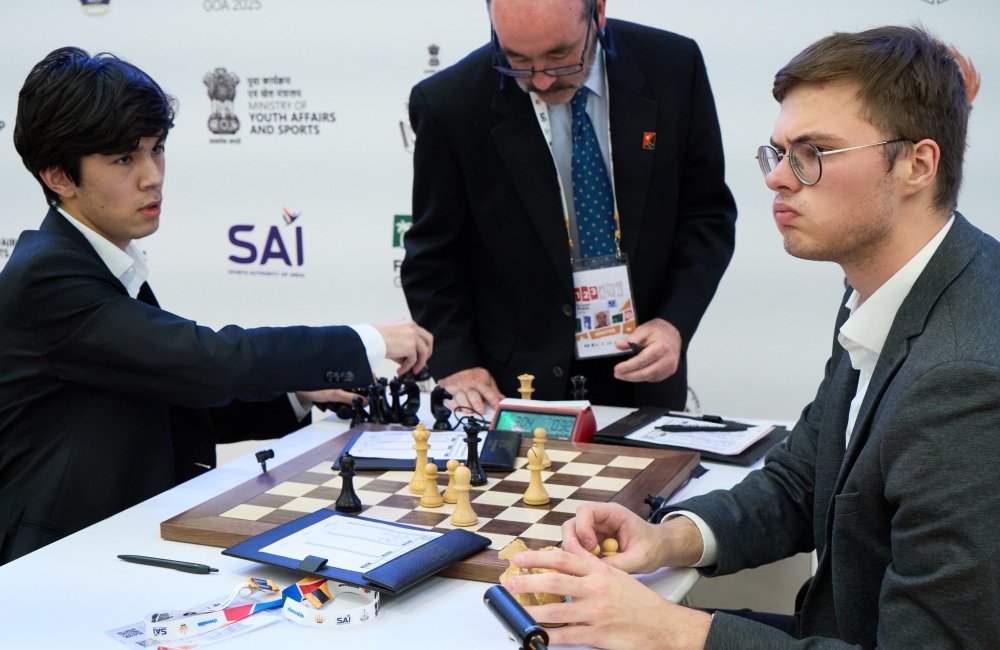
The atmosphere at the Rio Resort in Goa was electric this afternoon as players returned to the boards for another round of top-level action. The spotlight quickly shifted to Board 2, where Levon Aronian and Arjun Erigaisi delivered one of the most engaging and dynamic games of the day, drawing considerable attention from spectators and commentators alike. The ceremonial first moves were executed by two distinguished guests from the European chess community: Gunnar Björnsson, CEO of the Icelandic Chess Federation and Vice President of the European Chess Union, and Alojzije Janković, also a Vice President of the European Chess Union. Their presence underscored the strong international support and camaraderie surrounding the event. As the pieces were set in motion, anticipation built around whether the sharp tactical exchange between Aronian and Erigaisi would set the tone for the rest of the afternoon. It certainly did – capturing the spirit of competition that has defined this year’s battles in Goa. After around ninety minutes of play, the first result of the afternoon arrived. The Peruvian-Mexican phenomenon, GM José Eduardo Martínez Alcántara (2644), continued his remarkable run by securing a solid draw against India’s GM Pentala Harikrishna (2697). Martínez Alcántara has been producing the tournament of his life. In the previous two rounds, both times with the black pieces, he claimed impressive victories over GMs Nodirbek Abdusattorov and Alexey Sarana, winning the opening game of each match. Today, armed with the white pieces, he entered a deeply theoretical line of the Two Knights Defence, in which White typically gains a pawn at the cost of structural weaknesses and falling behind in development. One of these results came from GM Andrey Esipenko (2693), who, after yesterday’s exhausting tiebreak elimination of tournament favourite Vincent Keymer, opted for a calm and risk-free approach against Aleksey Grebnev (2611). Grebnev himself had just survived a taxing tiebreak against Maxime Vachier-Lagrave, making a peaceful outcome mutually understandable. Play followed established theory up to move twenty-five, with at least sixteen moves matching top-level over-the-board or correspondence encounters found in current databases. All known predecessors have ended in draws, including one by GM Javokhir Sindarov, also competing in this Round of 16. Given the speed and confidence with which both players executed their moves, it was evident they were well-prepared and content with a balanced outcome. Harikrishna will enjoy the white pieces in tomorrow’s game, while Martínez Alcántara has already demonstrated lethal form with black, having defeated both his previous opponents from that side of the board. With both players registering 99% accuracy, a peaceful result was practically inevitable, and fully justified. About an hour later, a short burst of activity swept through the playing hall as three games concluded within ten minutes, all ending in solid, uneventful draws. Drawing inspiration from a 2019 encounter in which Esipenko faced GM Rakhmanov (2638), Grebnev arrived fully equipped with home preparation in one of the most solid and respected continuations of the Petrov Defence. Esipenko attempted to sidestep prior theory with a small refinement – 12.Nb5 instead of the more common 12.Bf4 – but Grebnev remained completely unfazed. He rattled off his first twenty moves with confidence, showing no sign of discomfort. With a fully symmetrical pawn structure on the board and no practical prospects for either side to create winning chances, the players agreed to a draw on move thirty-one. Accuracy scores hovering around 95% reflected the clean and disciplined play delivered by both competitors. What awaits tomorrow remains to be seen, but based on today’s balance of power, this match appears a strong candidate to head for tiebreaks, a scenario in which both Esipenko and Grebnev may feel they have realistic chances to outplay the other. In a symmetrical variation of the English Opening, GM Alexander Donchenko (2641) and GM Lê Quang Liêm(2729) contested a strategically rich, though ultimately balanced, encounter. While the final accuracy scores, an impressive 98% for both players, might suggest a quiet affair, the game was anything but effortless. Both grandmasters invested significant time at key moments, carefully navigating the subtle nuances of the position. One of the most intriguing moments arose just out of the opening. Holding an extra pawn, Donchenko had the tempting option of 18.axb6 axb6 19.Rfc1, but this line allowed Black dynamic possibilities such as 19…Nc4, granting Lê Quang Liêm sufficient counterplay to maintain equilibrium. Recognizing the latent danger, and after deliberating for just over ten minutes, Donchenko chose the prudent path with 18.Qc2, returning the pawn and steering the game toward safety. From that moment, the position began to simplify naturally. Forced sequences followed, exchanges swept pieces off the board, and the game peacefully concluded with a draw on move thirty-one. A clean and professional display from both sides, the game exemplified the high level of precision that has come to define this stage of the tournament. Before the round began, I found myself—as I often do—chatting with fellow specialists while surveying the match-ups from a distance. Theo from Lichess and Shahid from ChessBase India are two of my usual companions in these pre-game exchanges. As we compared notes, Shahid and I agreed that the encounter between GM Gabriel Sargissian (2624) and GM Nodirbek Yakubboev (2689) was as close to a 50/50 toss-up as one could get. Although Yakubboev holds the higher rating on paper, Sargissian’s reputation as a rock-solid competitor, especially with the White pieces, made the prediction far from straightforward. Today’s clash, a pristine 99% accuracy effort by both players, once again highlighted the immense depth and technical discipline of these two grandmasters: no mistakes, no inaccuracies, simply a flawless game. Sargissian repeated his trusted Catalan, but was unable to carve out any meaningful edge from the opening. He ventured into a line that momentarily sacrifices a pawn in pursuit of active piece play, yet Yakubboev calmly returned the material, opting instead to secure a superior pawn structure. Subsequent simplifications flowed naturally, and with the position fully equalized, and both players still holding more than twenty-five minutes on their
Shockwaves in Goa: Dubov, Shankland, and the day of “giant killers”
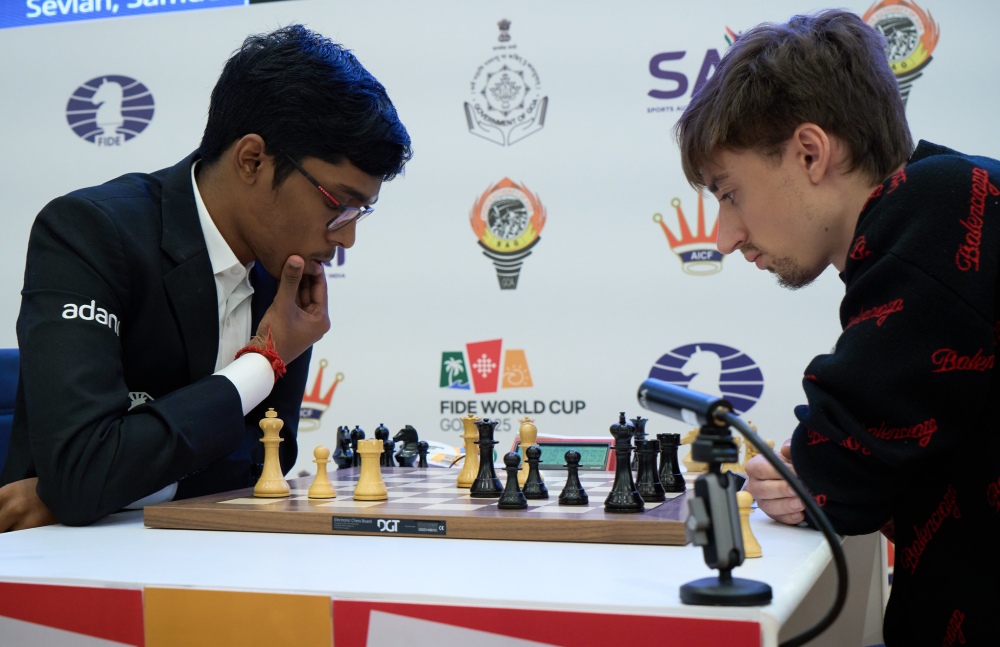
The fourth round of the FIDE World Cup in Goa ended with one of the most intense and dramatic tiebreak sessions of the event so far. Eleven matches returned to the playing hall this afternoon, with players battling it out across multiple time controls, from rapid to blitz and even Armageddon, to determine who would advance to the coveted round of sixteen. From the very start, it was clear that this would be a day of upsets and surprises. Several top seeds were eliminated, including multiple +2700-rated players, as underdogs seized their chances in rapid and blitz play. Experience, stamina, and nerves of steel became as crucial as opening preparation, as every mistake carried immediate consequences. By the end of the session, the field had been cut in half once again, revealing a captivating mix of established stars and fearless young talents. With just sixteen players remaining, the World Cup is entering its decisive phase, and the fight for the title, and for the coveted Candidates spots, is more open than ever. The round was opened by IA Dharmendra Kumar, President of the South Asian Chess Council and Chair of the 2025 FIDE World Cup Appeals Committee. He played 1.e4 for Peter Leko on board two. Quite surprisingly, no fewer than eight of the eleven tiebreak matches were decided in the very first section of the afternoon, consisting of two 15-minute games with a 10-second increment. The first player to qualify for the round of sixteen and the biggest surprise of the day was GM Aleksey Grebnev (2611), who eliminated one of the pre-tournament favourites, GM Maxime Vachier-Lagrave (2737). Known for his deep opening preparation and sharp tactical vision, Grebnev recently won the 2025 Dubai Open, a strong international event featuring several elite grandmasters, proving he is no stranger to facing world-class opposition. Although Vachier-Lagrave is a renowned specialist in blitz and rapid chess, Grebnev seized his chances brilliantly, winning the first game with White and then steering the second into a well-known theoretical draw to clinch the match. The key moment came in the first game: Despite being under pressure in a difficult endgame, the Frenchman still had drawing chances, but in time trouble he blundered with 47…Nd5+? (the correct move was 47…b5, with approximate equality). After 48.Kd4! b5 49.Bh6!, Black was suddenly lost due to the unstoppable threat of Bf8, which wins material. Soon after, another of the 2700+ favourites fell. GM Richard Rapport (2724) will have to wait another two years for another shot at the title, after losing both rapid tiebreak games to GM Sam Shankland (2654). A cornerstone of American chess for over a decade, known for his disciplined preparation and exceptional endgame technique, Shankland opted for the solid Caro–Kann Defence to neutralize Rapport’s creative initiative in the first game. The strategy paid off perfectly when the Hungarian number one faltered in the late middlegame. https://youtu.be/lbp_Yg4vY0Y “I wasn’t very optimistic going into the tiebreak. In classical, it hasn’t gone too badly, but in rapid, he’s clobbered me before,” Shankland admitted in his post-game interview. This time, however, he turned the tables convincingly. In the second game, Rapport’s decision to employ the Pirc Modern Defence backfired spectacularly, as he soon found himself in a cramped, passive position, and Shankland efficiently converted the advantage, sealing the match with a 25-move miniature. GM Nils Grandelius (2645) will also be leaving Goa tomorrow, eliminated by GM Pentala Harikrishna (2697). The long-time Swedish number one, celebrated for his deep opening preparation and creative ideas, came up short in the first game, letting his opponent off the hook at a critical moment. With the psychological edge on his side, the player from Andhra Pradesh, renowned for his strategic depth and superb endgame technique, displayed his full class in the second encounter. Harikrishna crafted a strategic masterpiece, patiently outmanoeuvring his opponent to secure victory and advance to Round Five. By winning the first game and comfortably drawing the second, accepting a repetition in a completely winning position, GM Frederik Svane (2638) secured his spot in the round of sixteen, joining his compatriot Alexander Donchenko and confirming the impressive depth of the younger German generation. His opponent, GM Shant Sargsyan (2667) of Armenia, was unable to recover after losing the first game. The key moment came on move thirty: White’s control of the d-file and pressure on the e5-pawn promised a lasting edge. However, after 30…Ne6! 31.Nxe5 Qg5! 32.Qxg5 Nxg5, Black would still have had reasonable drawing chances. Instead, short on time, Sargsyan spent two of his last three minutes to play 30…f6?, fatally weakening his kingside. Svane immediately seized the moment with 31.Nh4!, launching a decisive attack. Notably, Black could no longer contest the d-file with 31…Rad8, as 32.Nf5! wins material after 32…Qc7 33.Rxd8 Rxd8 34.Rxd8 Rxd8 35.Qa7, picking up at least a pawn. Despite determined resistance, the Armenian grandmaster could not save the game. GM Daniil Dubov (2684) produced one of the major upsets of the day, eliminating the 2023 Baku finalist and Indian hero GM Praggnanandhaa R (2771). Continuing the same pragmatic approach that has served him well in earlier tiebreaks, Dubov offered an early 12-move draw with the White pieces, effectively shifting the pressure onto his opponent to create winning chances in the second game. In his post-game interview with FIDE’s WIM Charlize van Zyl, Dubov explained his rationale: “Against players so good that I can’t really get an advantage in the opening, my strategy is to make a draw with White and get a game with Black.” And once again, his plan worked perfectly. In the diagrammed position, with both players down to their final minute, Praggnanandhaa erred with 35.Bxd5?, allowing 35…exf2+ 36.Qxf2 Bb6!, after which the Indian grandmaster was unable to defend against the threats along the long diagonal. “I don’t think he showed his best in this tournament, but even so, it was very close,” Dubov reflected after the game. https://youtu.be/K0r3Tyz2TWk With each round that passes, GM Arjun Erigaisi (2773) looks increasingly likely to secure
Tides turning in Goa: Aronian and Martínez advance to Round of 16 as field tightens
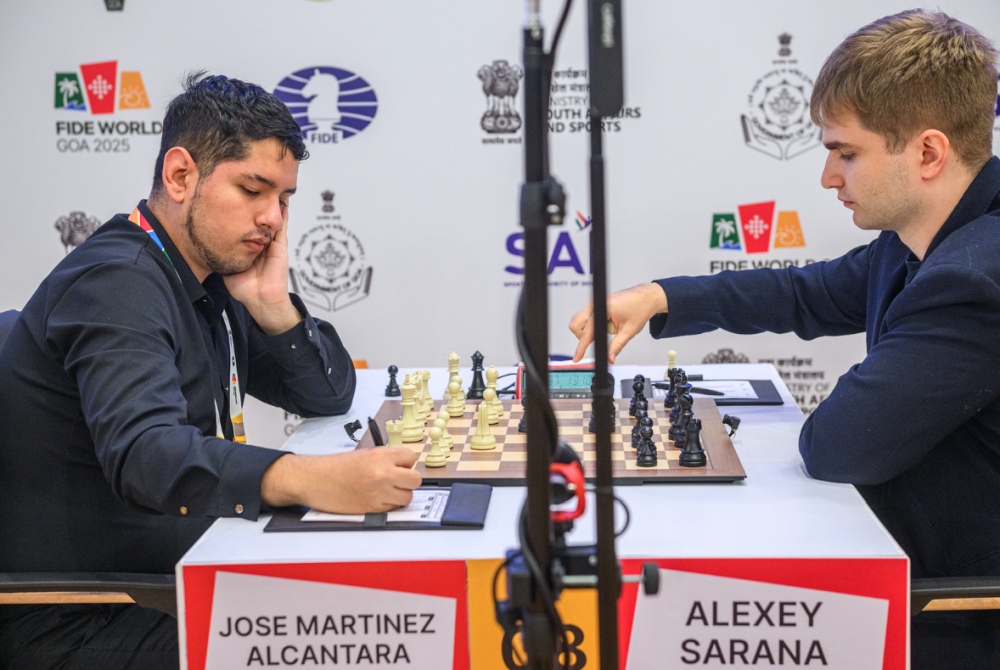
The tension in Goa was palpable as the Round of 32 of the FIDE World Cup resumed, with sixteen matches poised on a knife’s edge. The ceremonial first move, performed by Dr. Sagar Dilip Salgaocar, Managing Director of Geno Pharmaceuticals Pvt Ltd, set the stage for what would become a day filled with fierce strategic battles, high precision, and immense psychological pressure. Each player knew that a single mistake could mean the end of their World Cup journey. As the clocks started ticking, the players quickly settled into the rhythm of combat. The atmosphere inside the playing hall was a mix of quiet concentration and restrained intensity, the hum of moves being recorded, the soft clatter of captured pieces, and the quiet footsteps of arbiters echoing through the hall. Over the next six hours, fans witnessed a fascinating blend of caution and courage. While some grandmasters opted for pragmatic draws to secure qualification, others risked it all in pursuit of victory. From José Martínez Alcántara’s confident progression to the next stage to Levon Aronian’s creative handling of complications and Le Quang Liem’s composed elimination of Karthik Venkataraman, the day offered no shortage of drama. Yet, as so often happens at this stage of the event, many matches remained deadlocked, setting up a thrilling tiebreak showdown to decide who advances to the coveted final sixteen. Let’s take a deeper look into this afternoon’s action at the Rio Resort on Goa. Roughly an hour and a half into play, GM José Eduardo Martínez Alcántara (2644) became the first player to qualify for the final sixteen after forcing a draw against GM Alexey Sarana (2661). Having secured victory with Black in the previous game, the Mexican grandmaster only needed a draw with White to advance. Following his successful choice from the previous round, Martínez opted for the 2.c3 Alapin Variation against the Sicilian. Sarana appeared unfamiliar with the subtleties of the line and soon slipped in his move order. Sensing the opportunity, Martínez seized the initiative with the striking piece sacrifice 13.Nxa7! Nxa7 14.Ne5!, creating a double attack on the queen and the f7-pawn. This well-known opening trap has appeared at least five times before in master play, with five wins for White. However, after 14…Qb5 15.Bxf7+ Kd8, Martínez wisely chose the practical route, repeating moves with 16.Bb3 Ke8 17.Bf7+. Sarana had no real alternative but to accept the draw, as declining it would have meant losing significant material — and with it, his spot in the event. After confirming his qualification, Martínez joined the broadcast studio to share his thoughts on the game. https://youtu.be/-nW_znq0MSo Immediately afterwards, the first draw of the afternoon was confirmed – coincidentally, between the same players who had battled for over 110 moves in one of yesterday’s final games to finish. Playing with White, GM Gabriel Sargissian (2624) agreed to a draw with GM Awonder Liang (2710), meaning their match will be decided tomorrow afternoon in the tiebreaks. In a classical Catalan Opening, Sargissian achieved a slight edge out of the opening, but Liang gradually neutralized the position, and a threefold repetition was reached around move thirty. GMs Lorenzo Lodici (2560) and Samuel Sevian (2698) continued their consistent form in Goa with a 32-move draw by repetition in a standard Italian Opening. Playing flawlessly, both grandmasters achieved a 99% accuracy score in a topical line previously tested by Lodici’s teammate, GM Daniele Vocaturo. Following yesterday’s topsy-turvy encounter, GM Daniil Dubov (2684) chose a deeply theoretical line in the Vienna Variation of the Ragozin Defence against GM Praggnanandhaa R (2771), perhaps aiming to surprise his young opponent. However, Praggnanandhaa was fully prepared, defending with 99% accuracy and steering the game into an equal rook-and-pawn ending. A draw was agreed on move thirty, another addition to the long list of balanced results in this heavily analysed correspondence line. Dubov, World Rapid Champion in 2018, when he triumphed ahead of Carlsen, Mamedyarov, and Nakamura,often shines when the clock runs low, making their upcoming tiebreak one of the most anticipated of the day. The sequence of draws didn’t end there: with elimination on the line, few players were willing to take undue risks. Within the next forty-five minutes, five additional games were drawn, adding ten more names to tomorrow’s increasingly crowded tiebreak roster. It was a solid draw with a 98% accuracy score between GM Aleksey Grebnev (2611) and GM Maxime Vachier-Lagrave (2737). Playing the 3.Bb5 Moscow Variation against the Frenchman’s Sicilian Defence, Grebnev steered the game into a French-type pawn structure after a few early exchanges. In his post-game interview with WIM Charlize van Zyl, Vachier-Lagrave admitted that he wasn’t particularly familiar with his opponent: “I didn’t know much about Grebnev until about a month ago, when he played a qualifying match for the World Cup against my team colleague GM Marc’Andria Maurizzi. He’s very solid and very confident.” Grebnev managed to secure a small edge, exerting some control over the e5-square, but never enough to truly trouble the French number one. The game soon fizzled out into a draw by repetition around move thirty. https://youtu.be/ZMZkBkrQJAA The game between GM Richard Rapport (2724) and GM Sam Shankland (2654) also ended peacefully, this time with an impressive 99% accuracy score from both players. The two followed a 2018 Neo-Grünfeld encounter between top grandmasters Sjugirov and Li Chao until move thirteen. Shankland played quickly and confidently, suggesting deep home preparation, while Rapport appeared to be navigating largely on his own. The engines offered no significant improvements for either side – a truly flawless game. It’s hard to call a favourite in tomorrow’s tiebreak: both players have already proven themselves under pressure, with Shankland eliminating Vidit, and Rapport prevailing against Erdogmus earlier in the event. GM Shant Sargsyan (2667) and GM Frederik Svane (2638) produced yet another draw of exceptional quality, both recording a 99% accuracy score. In the second Catalan Opening of the day, Sargsyan opted for a line that netted him a clean pawn, but in return allowed Svane to establish
Round 4 Game 1: Aronian strikes, Martínez Alcantara shines on a day of fine margins and missed chances
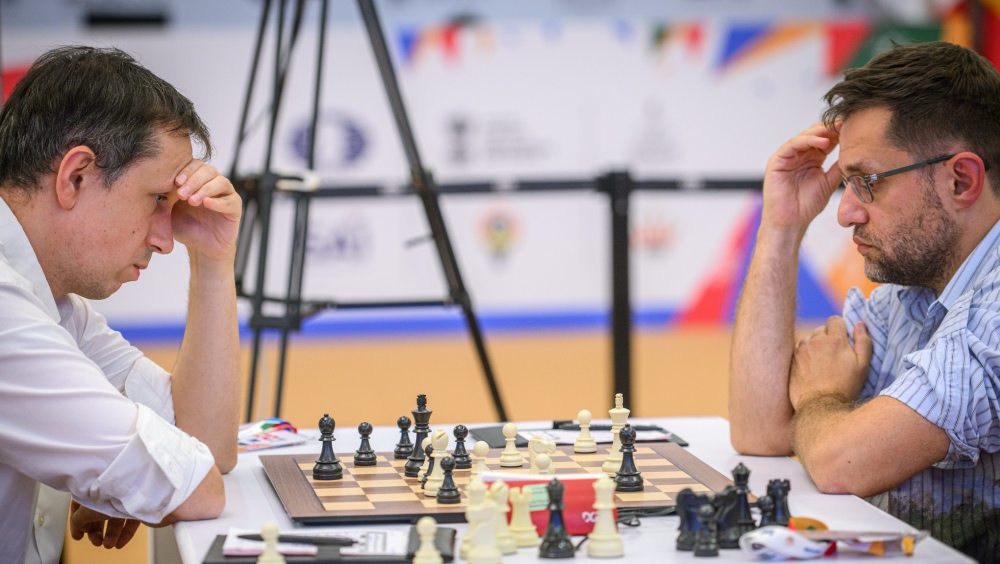
It was a day marked by precision, patience, and deep preparation in Goa, as the players returned to the board following the rest day. Out of sixteen classical encounters, only two produced decisive results, yet every game offered a glimpse into the razor-sharp margins that define modern elite chess. From surprise novelties in the opening phase to defensive masterpieces under time pressure, the round underscored how difficult it has become to win at this level, even with the slightest of edges. The spotlight victories belonged to GMs Levon Aronian and José Eduardo Martínez Alcántara. Aronian’s creative use of the rare 3.a3!? in the Vienna Game caught Radosław Wojtaszek completely off guard, while Martínez delivered another powerful performance in Goa, outplaying Alexey Sarana in dynamic fashion. Elsewhere, draws were the order of the day, though many of them – such as Dubov–Praggnanandhaa and Svane–Sargsyan – were full of energy, resourcefulness, and unrelenting accuracy. Despite just two decisive outcomes, the round was anything but dull. Several players, including Lorenzo Lodici, Vincent Keymer, and Nodirbek Yakubboev, showed impressive defensive resilience, while others like Awonder Liang and Daniil Dubov will be reflecting on missed chances. With the first classical games now complete, tension is rising: one more classical battle remains before potential tiebreaks decide who advances to Round 5. If today’s play was a display of calculation and control, tomorrow promises fireworks. Let’s take a deeper look into this afternoon’s action at the Rio Resort on Goa. Several officials visited the round this afternoon, including Mr. Michael Lobo, Chairman of Goa State Infrastructure Development Corporation and Member of the Legislative Assembly. The first game to finish didn’t take long. Just over an hour into the round, GM Peter Leko (2660) and GM Arjun Erigaisi (2769) agreed to a draw, but not before a brief theoretical skirmish in a sharp Sicilian line. Seeking to surprise the Hungarian veteran, Erigaisi unleashed the Cobra Variation in the Sicilian Taimanov – a rare and venomous choice he had played only once before, back in 2012, at the Raisoni Memorial U-15 when he was rated just 1548. Visibly taken aback, Leko spent over fifteen minutes choosing his response before deciding on the principled 6.Ndb5. Yet it soon became apparent that he was out of his preparation in this sharp line. Erigaisi pressed forward energetically, even sacrificing a pawn to seize the initiative on the queenside in a position with opposite-side castling. However, with his time ticking dangerously low, Leko wisely opted for an unforced threefold repetition, ensuring a half-point and avoiding unnecessary risk. A comfortable outcome for the Indian grandmaster, who will now have the rest of the afternoon to prepare for what could be a decisive encounter tomorrow, when he will have the White pieces. An hour passed before the next game concluded, roughly marking the halfway point of the playing session. Defending with the Black pieces, GM Aleksey Grebnev (2611) opted for the ever-solid Petroff Defence against GM Maxime Vachier-Lagrave (2737). Both players rattled off the first sixteen moves in textbook fashion, following a line deeply explored in modern correspondence chess, a domain heavily guided by computer analysis, and therefore a reliable touchstone for elite preparation. Unsurprisingly, all known correspondence encounters in this variation have previously ended in draws. The Frenchman was the first to deviate from established theory, introducing a fresh idea with 17.Rab1. Grebnev, fresh off his 25th Dubai Open victory earlier this year – took his time, spending nearly twenty minutes to navigate the complications and coolly neutralize White’s modest initiative. The balance never tilted decisively either way, and soon after, the players agreed to a threefold repetition. A pragmatic outcome for both sides, and one that quietly hints this tightly contested match could well be headed for a tiebreak showdown. Three more draws were signed before the first decisive game of the afternoon finally arrived. Among them, GM Wei Yi (2754) was unable to make any headway against GM Parham Maghsoodloo (2697). The 2018 World Junior Champion and Iranian National Champion in 2017, 2018, and 2021, Maghsoodloo has long been a fixture near the 2700 mark and enjoys a strong reputation for his balanced mix of positional solidity and dynamic resourcefulness. Facing the ever-dangerous Wei Yi, Maghsoodloo chose the Caro–Kann Defence, meeting the Exchange Variation with an early queen trade, a practical decision against an opponent known for his sharp attacking style. Though this left him with an isolated queen’s pawn, the Iranian defended confidently and never appeared in serious trouble. A calm and professional performance from Maghsoodloo, who comfortably secured the draw and perhaps another sign that this match, too, may be destined for tiebreaks. GM Nils Grandelius (2645) and GM Pentala Harikrishna (2697) produced an impeccably balanced encounter, both registering an impressive 98% accuracy according to computer evaluation. The game followed a well-trodden strategic line of the Ruy Lopez, leading to a symmetrical middlegame and eventually to a completely equal rook endgame after thirty-two precise moves. Neither side faltered, and the draw was a fair result of flawless technical play. For Harikrishna, it’s another steady performance, particularly valuable considering his excellent form with the White pieces in previous rounds. With the colours reversing tomorrow, spectators can likely expect a sharper, more dynamic battle. If the previous game clocked in at 98%, this one raised the bar even higher. GM Le Quang Liem (2729) and GM Karthik Venkataraman (2579) delivered a near-flawless performance, each achieving an astonishing 99% accuracy score. Playing with the Black pieces, India’s national champion was well prepared and solid throughout. He equalized comfortably and had little difficulty steering the game toward a peaceful conclusion, securing a well-earned half point against one of Asia’s strongest grandmasters. What came as a mild surprise, however, was Le Quang Liem’s choice of the London System — a line he famously covered in detail in his own Chessable “Lifetime Repertoire” course. It’s not every day that a top-level player tests their own published repertoire over the board! In his post-game interview, Karthik
A Day of Fun and Team Spirit at the World Cup in Goa
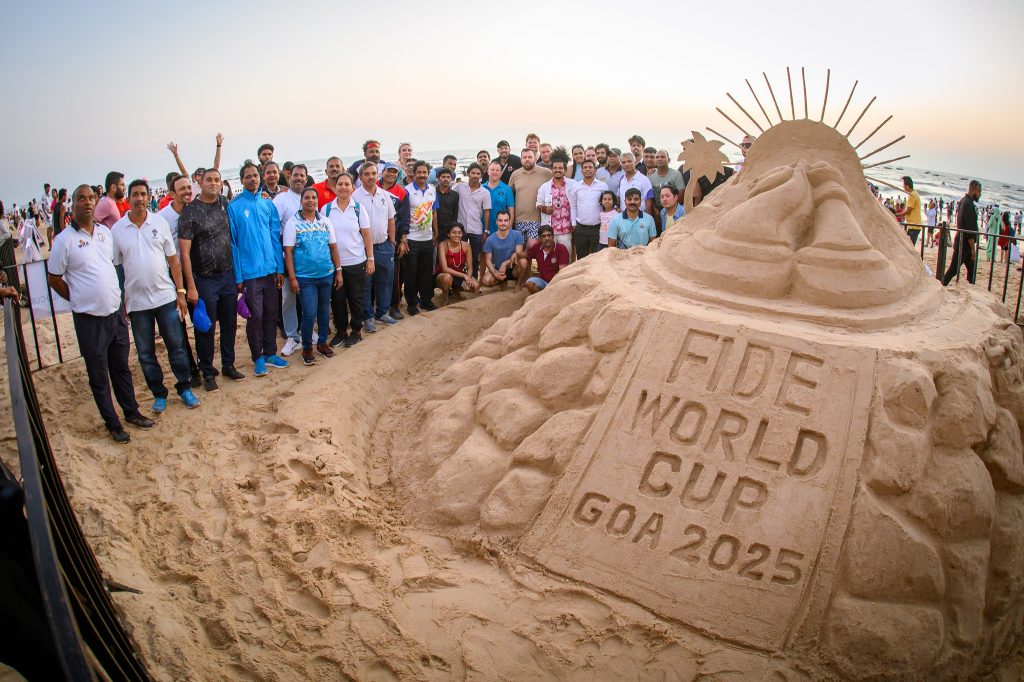
The rest day at the World Cup in Goa was a well-deserved break for players to unwind after the first stage of the tournament and recharge for the decisive rounds ahead. To make the most of the day, the Sports Department of the Government of Goa organized a lively afternoon of beachside recreation at Calangute Beach. The event brought together members of the organizing team and players like GM’s Salem Saleh and Jefferey Xiong who were eager to stay active and enjoy some friendly competition. Two teams were formed: Fair Play, captained by International Arbiter Gopakumar M, and Goa Gambit, led by FIDE General Secretary, Lukasz Turlej. Participants faced off in beach football, beach volleyball, and tug of war, with Turlej’s Goa Gambit emerging victorious in all three events. Music, local refreshments, and plenty of laughter filled the air, turning the afternoon into a joyful celebration of teamwork and friendship — a reminder that even in the midst of a world-class tournament, there’s always room for fun, connection, and community spirit.
Round 3 tiebreaks: Goa Turns Up the Heat – When the Clock Decides, The Better Players Rise
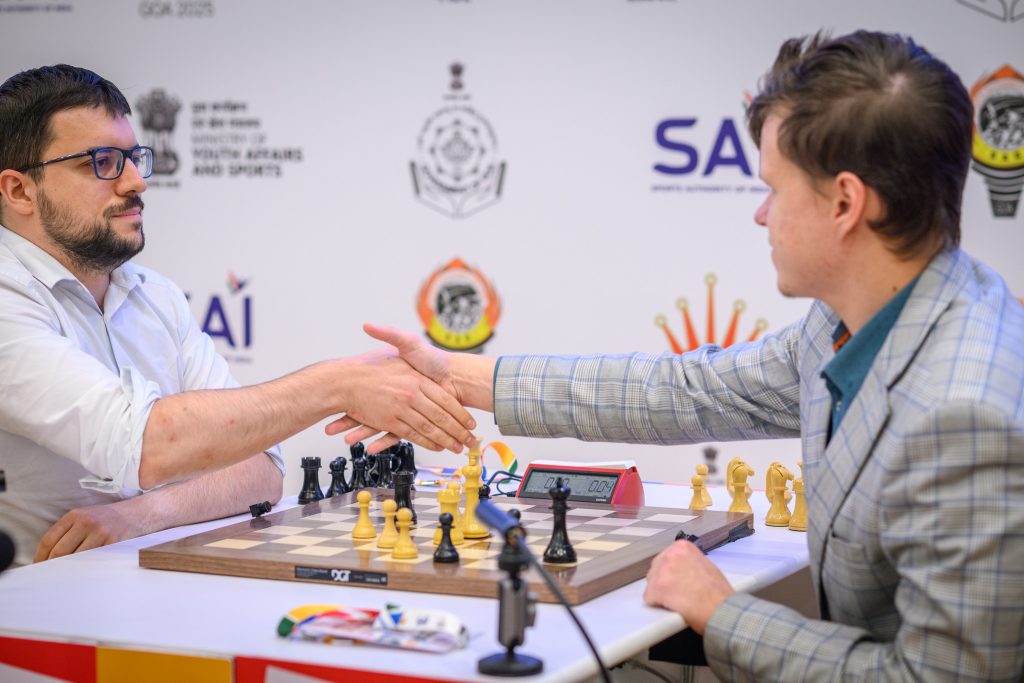
The 2025 FIDE World Cup continued to deliver high drama in Goa, as Round 3 tiebreaks produced a day filled with tension, brilliance, and heartbreak in equal measure. With places in the final 32 – and the Candidates qualification dream – on the line, nerves ran high across the playing hall. Every move carried enormous weight; a single mistake could mean the end of a months-long journey. In a recent podcast, World No. 3 Fabiano Caruana, already qualified for the Candidates, reflected on the nature of tiebreaks: “The better player usually wins.” As the clock speeds up, he explained, experience, composure, and precision tend to outweigh creative risks. That idea proved prophetic in Goa, as five of the six players rated above 2700 ultimately prevailed, their class showing through when the pressure was at its peak. The day’s results reinforced an enduring truth of knockout chess: when time dwindles and tension mounts, the difference between victory and elimination often lies not in preparation, but in psychology. Some players cracked under the relentless rhythm of rapid and blitz play; others thrived, finding clarity amid chaos. The crowd inside the playing venue could sense it – every board seemed to pulse with intensity. The round began with the ceremonial first move performed by GM Abhijit Kunte, India’s 4th Grandmaster (after Anand, Barua, and Harikrishna) and the Tournament Director of the World Cup. Born in Pune, Maharashtra, in 1977, Kunte was a true pioneer of Indian chess during the late 1990s and early 2000s – a player known for his classical style, deep positional understanding, and his lasting contributions as both coach and mentor. Three of the eleven tiebreaks were decided swiftly, ending after the first 15+10 rapid segment with clean 2–0 victories. The first player to book his ticket to the fourth round was GM Samuel Sevian, the American prodigy who once became the youngest grandmaster in U.S. history at just 13 years and 10 months. Known for his dynamic and fearless style, Sevian thrives in sharp middlegame battles where calculation and courage go hand in hand. Now hovering just below the 2700 rating mark, Sevian has been particularly impressive in rapid formats. After dispatching GM Tin Jingyao (2583) of Singapore in the second round tiebreaks, he repeated the feat today – drawing both classical games before convincingly defeating GM Evgeniy Najer (2610) in two rapid encounters. He shared his thoughts in a short but insightful post-game interview – don’t miss it! https://youtu.be/G7HDnE3VZoQ Not long after, I spotted GM Alexey Sarana (2661) leaving the playing venue with a broad smile — and a quick check confirmed why. He had just secured victory in both of his rapid games against GM Jorden Van Foreest (2697), earning his place in the fourth round. A former European Champion (2023) and a player who often hovers around the 2700 mark, the Serbian grandmaster is widely recognized for his technical precision and deep preparation. It had been a hard-fought match: after trading wins in the classical games, Sarana’s superior technique in a series of minor-piece endgames proved decisive in the rapid segment. FIDE’s interview specialist Charlize van Zyl caught up with him moments later for his thoughts on the event. “It’s a very tough tournament, and I try to take it match by match — because even in the first round, you can lose and be out,” Sarana reflected. “This tournament only happens once every two years, so it’s hard to predict anything, but of course the goal is to go as far as possible. As for the format, I think this is the most interesting tournament both to play and to watch. It’s very tense, but also very exciting — I really like the World Cup.” https://youtu.be/gmhECaz1TX8 The third player to advance to the fourth round with a perfect 2–0 score in the first rapid segment was GM Nodirbek Yakubboev of Uzbekistan (rated 2689). Born in 2002, Yakubboev is one of the brightest talents in Uzbek chess and a cornerstone of the national team that captured gold at the 2022 Chess Olympiad in Chennai. A three-time Uzbek national champion, he is known for his calm, classical style, backed by deep opening preparation and remarkable resilience under pressure. After two solid draws in the classical portion against GM Thai Dai Van Nguyen (2664), Yakubboev capitalized on a brief lapse in concentration from his opponent in the second rapid game – enough to secure the win and a spot among the final 32 contenders. Black had just played 23…Rac8? – a serious mistake in an otherwise balanced position. Both 23…Kh7 and 23…Nf5 would have kept the game roughly equal, but this slip proved fatal. Yakubboev immediately pounced with the tactical shot 24.Rxe6!, the key idea being that 24…fxe6 loses to 25.Nxe6, simultaneously attacking the queen and threatening checkmate on g7. Shocked by the sudden turn of events, Nguyen spent a couple of minutes searching for defensive resources. He could have tried 24…Qd7, but instead opted for 24…Qxc3, which failed to the deadly 25.Rxe7 – the rook on a1 cannot be taken due to 25.Ne6! With this victory Yakubboev comfortably advanced to Round 4. Four more players also qualified for the next round with 1.5–0.5 match victories. Among them was GM Richard Rapport (2724), who ended the impressive run of Turkey’s young star, GM Yagiz Kaan Erdogmus (2651). Despite holding his ground in both classical games – no small feat against such a formidable opponent – Erdogmus ultimately bowed out, leaving Goa with a wealth of experience and confidence for future events. Rapport, meanwhile, displayed the trademark class that has made him one of the most admired figures in modern chess. He ground down his opponent in the first rapid game through a long technical endgame, then showed precise defensive technique in the second, holding his ground in the tricky rook and bishop versus rook ending. Born in 1996 in Szombathely, Hungary, Rapport is celebrated for his creativity and originality, his unorthodox openings, and his fearless, artistic approach
World Cup chaos in Goa: 2700+ giants fall like ninepins as Gukesh, Giri, and Abdusattorov eliminated
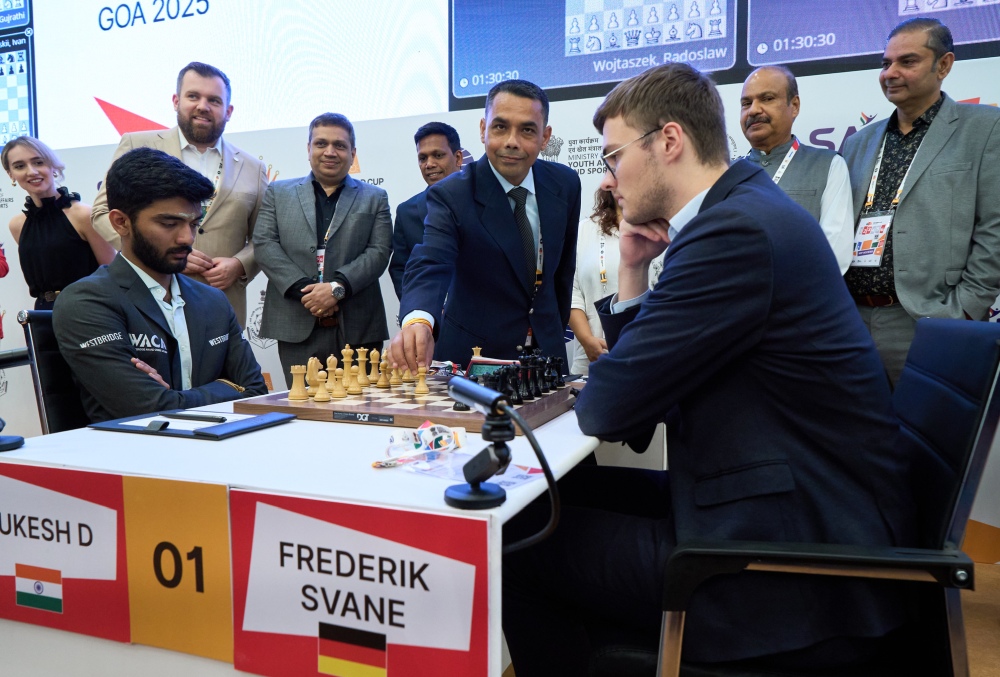
The second game of round three was every bit as thrilling as expected. The formidable German Olympiad squad – Keymer, Bluebaum, Donchenko, and the Svane brothers – created a sensation this afternoon at the Rio Resort in Goa. Four of them advanced to the fourth round, with two scoring massive upsets by eliminating the tournament’s top seed, GM Gukesh D, and fourth seed, GM Anish Giri, from the World Cup. The five German grandmasters have formed a close-knit unit during the event — sharing meals, walking to the venue together, and supporting one another throughout the rounds. And so far, their camaraderie seems to be paying off handsomely. With today’s action concluded, 11 of the 32 matches will be decided in tiebreaks tomorrow narrowing the field to the final 32 players still in contention for the prestigious World Cup trophy. Let’s take a closer look at the action as the afternoon unfolded. The round began with the ceremonial first move, performed by Mr. Ajit Roy of the Indian Administrative Service (IAS). Serving as Secretary to the Governor of Mizoram, Mr. Roy played 1.e4 on Board 1 in the game between World Champion GM Gukesh D and GM Frederik Svane of Germany. As it was Saturday, the playing hall was packed with spectators. To manage the large number of visitors, the organizers implemented a slot system, allowing fans to purchase tickets for specific time periods. Naturally, the first slot sells out almost instantly – it’s the only opportunity for visitors to enter the hall with their mobile phones and take a few selfies with the players. Although I usually head back to the media and broadcast center as soon as the games begin, this afternoon I decided to stay in the playing hall for the first thirty minutes to observe the players’ behaviour when it was not their move. As expected, most of the sixty-four participants – elite professionals that they are – remained seated, deeply focused and analysing variations even while their opponents were thinking. Focus, after all, is everything in chess. Yet a few preferred to stretch their legs in the early stages, each displaying their own distinct walking style. From today’s observations, Anish Giri stood out as the player who spent the most time pacing along the cordoned-off line. His manner is unmistakable: hands clasped behind his back, posture upright, stride calm and deliberate. He walks like a man fully in control – of his position on the board and of his composure off it – graceful, self-assured, and just a touch enigmatic. A master of opening theory, Giri is always impeccably prepared, often leaving his opponents to shoulder the burden of early thought. Maxime Vachier-Lagrave’s walking style mirrors the very essence of his chess — focused, brisk, and quietly self-assured. He paces lightly between the boards with a subtle bounce in his stride, hands sometimes tucked into his pockets or folded neatly behind his back. He walks like a man calculating variations mid-step: absorbed, calm, yet charged with a quiet inner energy. Former World Cup winner Levon Aronian also enjoys taking strolls during the opening phase. Often smiling or chatting briefly with colleagues, he can frequently be seen wandering toward the lower boards, keeping an eye on the games of his former Armenian teammates — Sargissian, Hovhannisyan, and Sargsyan – who continue to battle it out in the event. Other elite players, such as Mamedyarov, Erigaisi, and Keymer, also favour mid-opening walks, usually with their hands casually in their pockets. Meanwhile, Dubov, Praggnanandhaa, and Rapport prefer the nearby refreshment area, where two large screens display miniature versions of every game, allowing them to monitor their own boards – and everyone else’s – without breaking their rhythm. Exactly an hour and a half into play, the first player had already secured qualification to the fourth round — the stage where only 32 competitors remain in contention for the coveted Candidates spots. Having won his first game yesterday, GM Matthias Bluebaum (2687), the recent runner-up at the Samarkand Grand Swiss, opted for the Exchange Variation of the King’s Indian Defence, calmly trading off every piece in sight and forcing an effortless draw to seal his spot in the next round. His opponent, 15-year-old GM Ivan Zemlyanskii (2596), can take great pride in his performance. He leaves Goa with a well-earned €11,000 prize and, more importantly, a wealth of experience that will serve him well in future competitions. As we’ve seen repeatedly in previous rounds, the 2700+ rated players are losing momentum. The latest casualty was Slovenian GM Vladimir Fedoseev (2720), who bowed out of the event after losing his second game to Poland’s ever-dangerous GM Radoslaw Wojtaszek. A six-time Polish champion, Wojtaszek may be rated 2654 at the moment, but with a career peak of 2750, he remains one of the most respected and solid players of his generation. Needing a win with Black against such a stable opponent, Fedoseev resorted to a sharp line of the English Defence that modern theory has all but refuted. He chose the risky continuation 4…f5?, and after 5.exf5 Bxg2 6.Qh5+ g6 7.fxg6 Bg7 8.gxh7+ Kf8, Black temporarily wins a rook on h1 — but at a terrible price. The resulting attack for White is well-known to be decisive, with modern engines giving a clear +2 evaluation. Fedoseev was gambling that Wojtaszek might not recall the precise theoretical nuances, and for a brief moment, it almost worked. But in the end, his luck ran out, and the Polish grandmaster’s attack broke through convincingly. We caught up with Wojtaszek in the interview area afterward, where he shared his thoughts on the match and the critical moments of the opening. https://youtu.be/uez5jXEsnIk The full game can be consulted on the Live Games section of the tournament website. Dutch GM Jorden Van Foreest (2697) will live to fight another day in Goa. Needing a win after yesterday’s loss to GM Alexey Sarana (2661), the ever-creative Dutchman once again demonstrated why he’s considered one of the most
Round 3, Game 1: Upsets, attacks, and masterclasses – Abdusattorov in danger
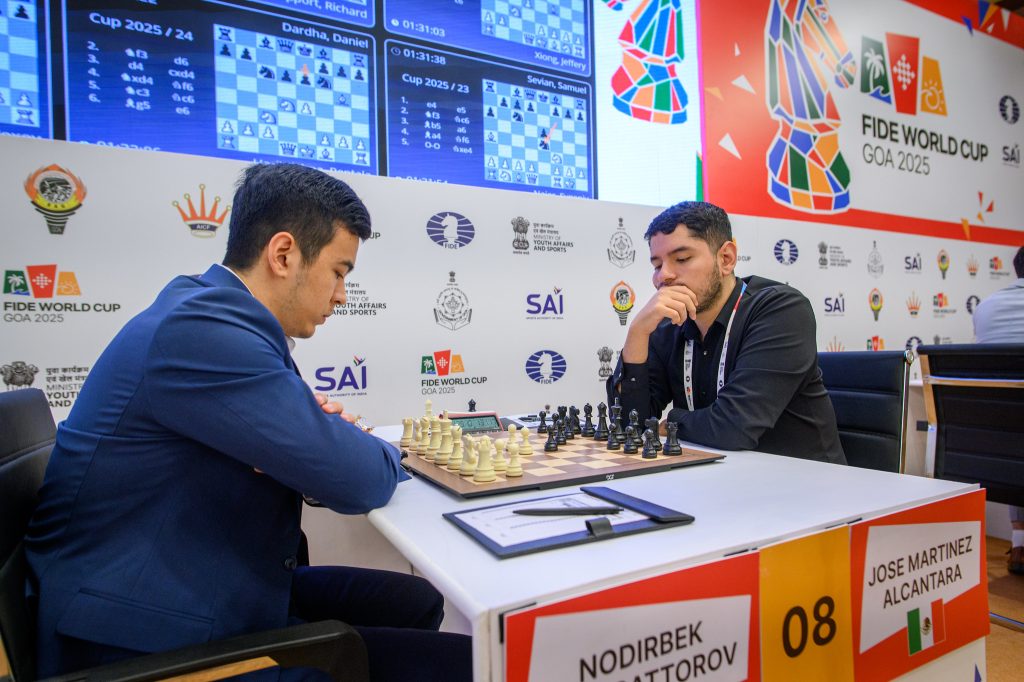
The shock of the first game of Round 3 came from GM José Eduardo Martínez Alcántara (2644), who scored a fantastic win against one of the strongest players in the tournament, GM Nodirbek Abdusattorov, Uzbekistan’s number one, rated 2750 and seeded eighth. Playing with Black, Martínez Alcántara neutralized an ambitious opening idea by Abdusattorov that involved a positional exchange sacrifice. The game became highly unbalanced, but the Mexican GM kept his cool and took over the initiative once his opponent overextended. It was a huge win that puts him in a commanding position to advance to Round 4, provided he can avoid defeat tomorrow. Martínez later analysed the fascinating encounter live in our broadcast studio. Watch his full breakdown on FIDE YouTube. https://youtu.be/336BKDB7EZ0 World Champion GM Gukesh D (2752) was held to a draw by GM Frederik Svane (2638). The German grandmaster, though pleased with the result, felt there had been room for more: “It was my first time playing against the World Champion, so it was very special. A draw is fine, but I would have loved to put more pressure on him,” explained Svane in his post-game interview. https://youtu.be/MkwX3JxickE Other relatively surprising results included draws by GMs Anish Giri (2759), Richard Rapport (2724), and Daniil Dubov (2684) – all playing White against lower-rated opponents. Let’s take a closer look at the action as the afternoon unfolded. Opening ceremony and early action The round began on Board 2, where Indian GM Arjun Erigaisi (2769) faced Uzbekistan’s Olympiad medalist Shamsiddin Vokhidov (2640). The ceremonial first move, 1.e4, was played by Dr. Ajay Gaude, Director of Sports for the Government of Goa. Erigaisi humorously retrieved the pawn and switched to 1.d4 once the principal arbiter declared the round officially open. For the first time in this World Cup, none of the 32 games ended by the two-hour halfway mark — a testament both to the balance among the players and to their determination to strike first. Harikrishna’s masterclass The first decisive result arrived after two and a half hours, when GM Pentala Harikrishna (2697) dismantled GM Daniel Dardha (2605), Belgium’s four-time national champion. The Indian grandmaster — possibly inspired by his recent work as Gukesh’s second during the World Championship — played with clarity and confidence, launching a textbook kingside assault in an unbalanced Sicilian. After Dardha’s inaccurate opening play, Harikrishna demonstrated precise attacking technique. 22.Re3 (threatening 23.Rg3#) Bc7 23.Nxe4 (with the idea of 24.Nxf6#) Bxe4 24.Rxe4 f5 25.Rxe6!! Following 25…fxe6 26.Bb3!, Black would be forced to give up his queen to stop checkmate – a brilliant finish from the Andhra Pradesh native. Idani’s Creative Breakthrough Shortly afterward, GM Pouya Idani (2601) produced another upset by defeating GM Andrey Esipenko (2693) with a daring kingside pawn advance and a spectacular piece sacrifice. The key moment came after 24.Nxf7! Kxf7 25.Rxg6 Rg8 26.cxd4 Nxd4? (better was 26…exd4) 27.Bxd4 Qxd4 28.Qf5! Caught off guard by this powerful move, Esipenko resigned after 28…Rae8 29.Nf3!, unable to defend against multiple threats. “I was extremely tired after yesterday’s tiebreaks, so I want to thank my second for coming up with this idea,” said Idani. “I had some doubts before the game, but he insisted I should go for it.” https://youtu.be/daXwmJsZzfo Erigaisi’s smooth victory Meanwhile, GM Arjun Erigaisi (2769) overpowered GM Shamsiddin Vokhidov (2640) in just over twenty moves, showcasing deep preparation and flawless execution. “Even though this line is considered solid, I had prepared the novelty 18.Qd2 – it’s easy for Black to go wrong if he doesn’t know it,” explained Erigaisi. “I was actually planning to play it against Wei Yi in Norway Chess.” You can replay the full game in the Live Games section on the tournament website. FIDE’s star interviewer WIM Charlize van Zyl caught up with Arjun for a quick postgame interview in which he discussed some of the key moves. https://youtu.be/cgAQqQVhgvM Other winners Also taking the lead in their matches were Levon Aronian (2722), Le Quang Liem (2729), Matthias Bluebaum (2687), Shant Sargsyan (2667), Peter Leko (2666), Alexey Sarana (2661), Radoslaw Wojtaszek (2654), Pranav V (2641), and Aleksey Grebnev (2611). Ivanchuk’s press conference Earlier in the day, Ukrainian legend GM Vasyl Ivanchuk, eliminated in Round 2 by GM Samuel Shankland, met the press at the media centre. Ivanchuk praised the tournament’s organization and confirmed his participation in the World Rapid & Blitz Championships in Doha later this year. With nine participations in eleven editions of the World Cup, Ivanchuk remains one of the event’s most frequent and respected competitors. Game 2 of Round 3 will be played on November 8, starting at 3 PM local time. The action can be followed live on the FIDE YouTube Channel, featuring expert commentary by GMs Evgenij Miroshnichenko and Jan Gustafsson. To watch the games in person, tickets can be purchased [HERE] Written by IM Michael Rahal Photos: Michal Walusza and Eteri Kublashvili
Tiebreak drama at 2025 FIDE World Cup in Goa: Niemann and Oro eliminated
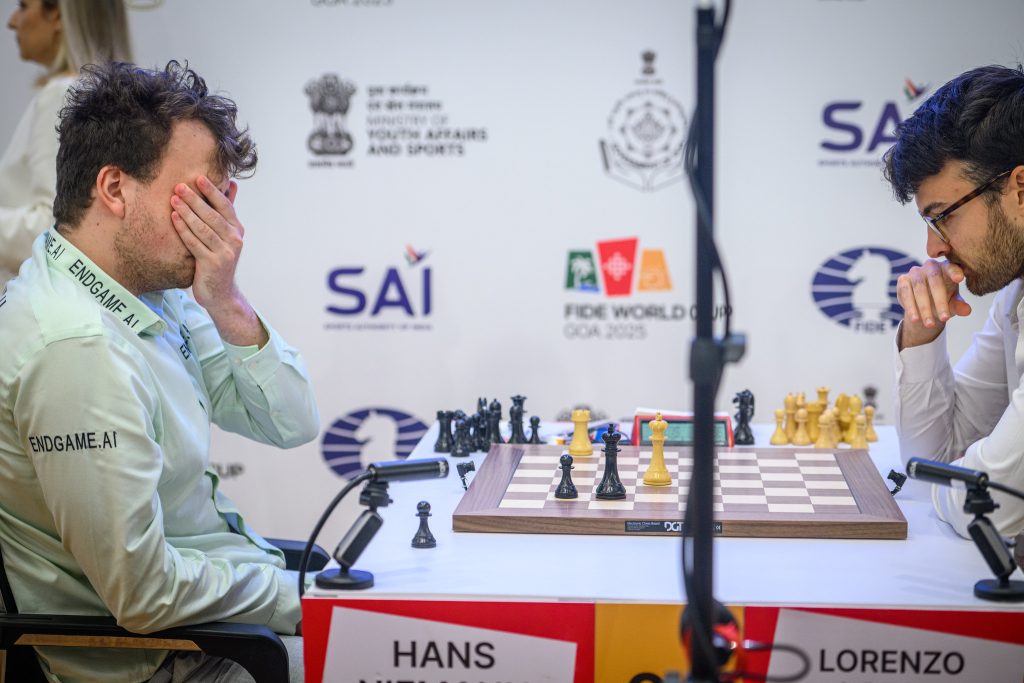
When the best player in the world – former World Champion and 2023 World Cup winner Magnus Carlsen – decides to set everything aside and join the live broadcast, you know the tiebreaks are going to be massive. And they didn’t disappoint! Favourites fell, prodigies stumbled, and the round delivered everything a chess fan could wish for: seven matches going all the way to blitz and even one Armageddon decider. The atmosphere in Goa was electric. Even Ian Nepomniachtchi’s mild post-elimination complaints on Telegram after Round Two were quickly forgotten when another top player addressed the issue directly. “The conditions are fine here,” said Vidit Gujrathi, who had just eliminated Argentine prodigy Faustino Oro. “You can always get a few complaints when you organize a big tournament. He could have been more specific, but I think people are being too harsh on him. Maybe he just lost and said something emotional – I’ll give him the benefit of the doubt. But regarding the conditions, I don’t see any reason to complain.” The Round 2 tiebreaks were officially opened by Mahesh Candolkar, President of the Goa Chess Federation, and Dr. V. Candavelou, Chief Secretary of Goa, who performed the ceremonial first move on Board 1. Rapid 15/10 The shock of the first rapid session came from the elimination of GM Hans Moke Niemann (2738). The American 10th seed was defeated by Italy’s GM Lorenzo Lodici (2560), who held him to two classical draws before winning the first of the two 15-minute rapid games in what was arguably one of the day’s key moments. Lodici seized a decisive advantage earlier, but Niemann appeared to believe he could still draw. Short on time, Niemann blundered with 72…Rg1? – just one square too far! The sequence 73.f6 Rf1 74.Be3! was the point as Black had no Rg1+. After 74…Rf3 75.h7+ Kh8 76.f7 the deal was sealed, 1-0. The only move for Black was 72…Rg2! Compared to the line above after 73.f6 Rf2! 74.Be3 (Bc1) he has the saving check 74…Rg2+. Visibly frustrated, Niemann took some time alone to review the lines on his phone before leaving the venue. Meanwhile, Faustino Oro’s dream run came to an end against Vidit Gujrathi, who prevailed in the first set of rapid games. “I was a bit worried going into tiebreaks — Faustino is very good, and I hadn’t played much rapid lately,” said Vidit. “I tried my best, prepared well, and it worked out.” FIDE’s Charlize van Zyl interviewed Vidit after the match — don’t miss the video! https://youtu.be/ANF6L47_S7k After the match, Oro reflected to this author: “I fell behind on the clock in the second game and couldn’t recover.” Despite his disappointment, he left Goa with valuable experience and a growing fan base. Meanwhile, Nodirbek Abdusattorov, Shakhriyar Mamedyarov, Stamatis Kourkoulos-Arditis (pictured below), Sam Sevian, Daniel Darhda, Bogdan-Daniel Deac, Radoslaw Wojtaszek, Vladislav Artemiev, Pranesh M, Pranav V, Robert Hovhannisyan and Shamsiddin Vokhidov all won their matches at this stage, qualifying for Round 3. Rapid 10/10 The second set of rapid games (10 minutes + 10 seconds) proved even tougher: only three of the ten undecided matches were resolved. GMs Gabriel Sargissian (2611) and Shant Sargsyan (2664) both advanced after long, evenly matched fights against Maxim Rodshtein (2611) and Jorge Cori (2601) respectively. Former World Rapid Champion GM Daniil Dubov (2674) also moved on, defeating GM Jinshi Bai (2595). The Chinese player had neutralized Dubov’s advantages through four games, but a critical error in the Exchange Slav. 12…g4? – cost him dearly. After 13.Bh4! gxf3 14.Bxf3, Bai’s knight on h5 was doomed, and Dubov converted comfortably. Blitz 5/3 Seven matches came down to blitz (5 minutes + 3 seconds). The most dramatic included GM Praggnanandhaa R (2771) overcoming GM Temur Kuybokarov (2535) after falling behind and levelling the score in the first rapid set. In the decisive blitz game, Kuybokarov reached an overwhelming position, but first failed to find a couple winning continuations and then missed a draw. After 37.b6! cxb6 38. Rc1 White’s c-pawn is simply unstoppable. Temur, however, played 37.Rd7? Kf7 38.Bxe7?? (White was still winning after the precise 38.Bd4!) 38…Rxe7. Here Kuybokarov missed a simple defensive resource 39.Rd4, playing 39.Re1?? instead. After 39…Rxd7 40.cxd7 Rxh4+! 41.Kg2 Rd4, the Australian GM was forced to resign – a heartbreaking end to an excellent match. Elsewhere, GM Nikita Vitiugov (2654) bowed out to GM S. Narayanan (2617), who won both 5/3 games after six straight draws in the classical and rapid portions. Blitz 3/2 Two matches went to the final blitz stage (3 minutes + 2 seconds). As expected, the veterans’ clash between GM Ivan Cheparinov (2626) and GM Michael Adams (2635) lived up to its billing. In a show of precision and stamina, Adams won both games, advancing to Round 3 – another deep run in his illustrious career. Armageddon The last and most dramatic tiebreak saw GM Rauf Mamedov (2655) face GM Rasmus Svane (2614). Under the new bidding system for the Armageddon decider, Mamedov bid 3:00, while Svane chose 3:13, thereby securing White. “We were both struggling with the black pieces, me even more than him, so I bid slightly higher to ensure White,” Svane later explained. The decision paid off. Svane converted a slightly better endgame into victory — one of the biggest wins of his career. Looking ahead Sixty-four players remain as Round 3 begins. With three Candidates spots at stake, every match is critical. The field is wide open – and if the tiebreaks were any indication, the coming rounds promise even more spectacular battles. The full pairings for Round 3 matches can be found here [HERE]. Game One of Round 3 will be played on November 7 at 3 PM local time. The action can be followed live on the FIDE YouTube Channel, featuring expert commentary by GMs Evgenij Miroshnichenko and Jan Gustafsson. To watch the games in person, tickets can be purchased [HERE] Written by IM Michael Rahal Photos: Michal Walusza and Eteri Kublashvili